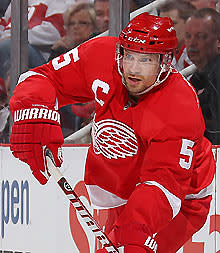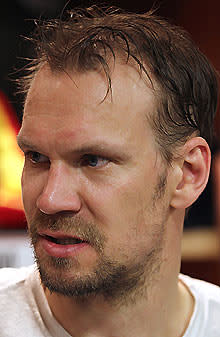Lidstrom's return hinged on elite status
Know this about Nicklas Lidstrom(notes): One day he will retire before the Detroit Red Wings want him to. He will walk away from the NHL when he's still able to play. He will leave when he could stay.
But that day hasn’t arrived yet, and there are two main reasons for that: Lidstrom believes he can continue to perform at a high level at age 41, and he believes the Wings can continue to compete for the Stanley Cup. That is why he has agreed to another one-year deal with Detroit, putting off the inevitable for at least a little while longer.
Lidstrom is a finalist for the Norris Trophy as the NHL's best defenseman, and if he wins it Wednesday night in Las Vegas, he will have won seven – only one behind all-time leader Bobby Orr. The Wings have a strong core of players, and with salary-cap space, committed ownership and savvy management, they have the ability to add to it.
"I don't even want to think about the Detroit Red Wings without Nick Lidstrom," Wings general manager Ken Holland said Monday. "I have gone on record saying that when Nick retires, I'm going to be in the next room with a retirement press conference as well. So I'm glad Nick has decided to come back one more year, because I love it, too."
Holland was joking about that last part. I think.
Lidstrom has set an almost impossibly high standard for himself. The Wings have never missed the playoffs since he joined them in 1991-92. He has sat out only a handful of games in his 19 seasons while logging countless minutes – against top opponents, on both special teams units, each and every night. He has won four Cups along with those six Norrises, and he should have even more hardware.
He is a finalist for the Lady Byng Trophy, which goes to the player with "the best type of sportsmanship and gentlemanly conduct combined with a high standard of playing ability." He has never won it even though he defines it – classy, dignified, an elite defenseman who rarely takes penalties. The Wings captain is also a finalist for the Mark Messier leadership award.
Nobody's perfect, but they call him the Perfect Human for a reason. He will not accept much imperfection. Last season, he was not named a Norris finalist for only the second time in a dozen years. It could have been the beginning of the end.
"I think if I would have taken a step back from how I finished last year, it could have been a different situation for me," Lidstrom said. "It could have been a different decision for me, too. Maybe my ice time would have dropped and I wouldn't play at the level I want to compete at, so coming off this season helped me to make this decision."
When is the right time to retire? If you have the chance to go out on top, should you take it? Should you wait until you have slipped below the standard you have set for yourself? Should you keep going until you have squeezed every last ounce out of your ability and they have to drag you off the ice?
There is no easy answer. For every player, it's a deeply personal question of body, mind and soul. For elite athletes, it can be particularly delicate because the brighter the star, the more he has to fade – and the more opinions and agendas become involved.
Lidstrom has watched several his teammates go through it. He just watched his defense partner, Brian Rafalski(notes), retire with one year and $6 million left on his contract. No one saw that coming, not even Lidstrom, even though Rafalski was 37 and had been playing in pain. Holland was asked what it would have been like to lose Rafalski and Lidstrom in the same summer.
"Well, obviously if we had lost both, it would have been …" Holland said, taking a deep breath, "probably devastating."
Holland and Wings coach Mike Babcock sat down with Lidstrom and told him they really, really wanted him back now, as if they weren't desperate to have him back before Rafalski retired. Lidstrom said he considered that, but that's not what it came down to. It didn't come down to going out on top or not, either, and it surely won't come down to being dragged off the ice eventually.
Lidstrom was asked if he might have retired had the Wings won the Cup. He noted that losing in the playoffs leaves a sour taste, whereas winning the Cup leaves you feeling great. But he said: "It's hard to say. It could have been easier to walk away. That's for sure. But who knows if I still would have had the motivation to come back and maybe do a repeat?" He laughed.
If you win the Cup at just the right time, you're lucky. The Boston Bruins' Mark Recchi(notes) won it and quit last week at age 43. If you come back for the Cup, you're gambling. Mike Modano(notes) signed with the Wings last season to take one last shot at age 40 and ended up regretting it – suffering a serious injury, becoming a spare part in the playoffs and falling short of his goal.
The Wings have a long history of great players – or great role players – hanging on as long as possible and accepting lesser roles. Kris Draper(notes), a former winner of the Selke Trophy as the NHL's best defensive forward, and Chris Osgood(notes), one of 10 goaltenders to win 400 games, might be eased out to pasture reluctantly this summer.
Even Steve Yzerman, the iconic captain, battled through injuries as a bottom-six forward before he retired in 2006. I'll never forget when he called himself a "top-12 forward." I asked if he really considered himself in the top 12. He shot me dirty look, but I wasn't implying he was the 13th or 14th forward. Quite the opposite. No matter where Yzerman had been in the lineup, I had never thought of him as anything but a top player before.
Chris Chelios(notes), a future Hall of Fame defenseman, returned to the Wings and retired in August at age 48, after going so far as to scrap in the minors for a season and come up for seven games with the Atlanta Thrashers. You've got to love that passion, but that's not how Lidstrom is going to go out – not even close.
"I admired Chelios for what he was able to do, to play up in the high 40s," Lidstrom said. "But his ice time dropped, and he was accepting that, too. I think if I was put in the same situation, I probably wouldn't have as much fun. I think that's the difference between me and Cheli. He was able to do that because of the love of the game, and I have to be at a certain level to play [up to] my own expectations."
For Lidstrom, that's what it comes down to. He said he went back to the gym to make sure he had the motivation to train for another long season. When he's motivated, that means he's having fun. When he's having fun, that means he's playing 23 to 25 minutes a night, against top opponents, on both special teams units, each and every night. When he's doing that, that means the Wings are usually winning.
"If I drop off and if I can't keep up to that level …" Lidstrom said, not finishing the sentence. "I said this earlier: If I'm a sixth or seventh defenseman, I probably wouldn't be playing because I wouldn't have as much fun as when you're involved and when you're contributing to the team."
I’m sure Lidstrom wouldn’t approach being a sixth or seventh defenseman. He’s a No. 1 defenseman, period. Lidstrom at, say, 75 percent of his prime might be better than much of the NHL, but might not be good enough for him.
Who knows how long Lidstrom can keep playing at a level high enough to satisfy him? Who knows how long the Wings can keep contending for the Cup? Logic says both should have fallen off a long time ago. But Lidstrom is still playing as well as he ever has, and the Wings still have a core that includes Pavel Datsyuk(notes) and Henrik Zetterberg(notes) in their primes.
Holland now has rare flexibility to make off-season moves and will explore trades and free agency. He has Rafalski's $6 million to spend, and Lidstrom accepted the same salary he made last season – $6.2 million – which is actually a smaller piece of the pie now because the cap is increasing to about $64 million.
So Lidstrom will train, Holland will make his moves and we'll see what happens next season.
"When it's over," Lidstrom said, "you re-evaluate how you played, how your body feels, how your mind feels, and then you kind of set your sights [on] if you're ready to do it again."
One day, he won't be ready, and neither will we.
Other popular stories on Yahoo! Sports:
• Top 15 NBA Draft sleepers | Where will Jimmer land?
• Bud Selig rejects team's $3 billion TV deal
• Venus Williams suffers fashion flop in first round at Wimbledon
• Rory McIlroy is no Tiger Woods, and maybe that's a good thing



